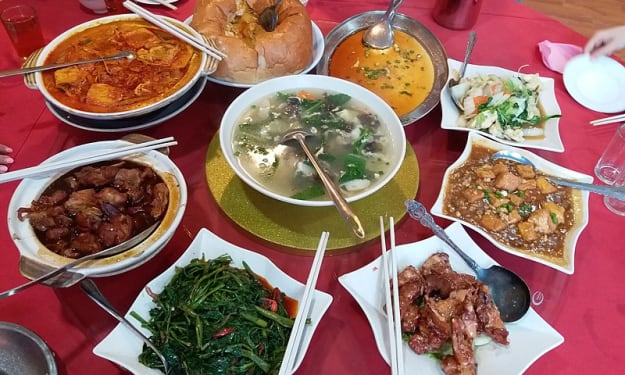We Need to Teach Our Daughters They Are Enough
Be the woman who walks in the room and stops that conversation in its tracks.

When I was five, my grandfather tried to convince me that men were superior to women.
I don’t remember this, being so young at the time, but my mother has since recounted the story to me. I was standing there, looking up at my beloved grandpa with wide eyes, nodding along when she walked in and heard what he was saying.
After that, she never allowed me to be alone with him again — not until I was older and less impressionable, anyway.
‘Enough’ — so much of our identity revolves around that one little word.
And truth be told, I’m scared to death to have a daughter of my own because of it.
As a child, as we listen to the adults around us, our identities are already riddled with comparison. Is she cute enough? Sweet enough? Growing fast enough? As we grow up, the expectations broaden and even more is put on our shoulders. Is she well-mannered enough? Pretty enough? Smart enough? Popular enough?
Facing the teen years, along with expectation from the outside world, we start to add in our own self-doubt and standards. Is she beautiful-skinny-smart-dedicated-mature-polite-friendly-cautious enough?
And then adulthood — where self-doubt, the weight of outside expectations, and the added edge of double standards have us facing a lifetime of never adding up to what we “should” be.
Is she beautiful-skinny-mature-fun-smart-friendly-cautious-loyal-reliable-responsible-successful-stable-together enough?
As women, we can be told that we’re too much and not enough, nearly in the same sentence.
In a world so full of body-shaming, slut-shaming, victim-blaming, and mom guilt, how are we to ever fully believe that we are enough just as we are, unless it is deeply engrained in our character?
Double standards infuse our daily lives, and if we let them, they basically tell us that we will never achieve true, worthy womanhood in the eyes of the world.
- If she smiles at a man, it’s inviting... if she doesn’t smile, it’s standoffish.
- If she has sex, she’s a slut... if she doesn’t, she’s a prude; men want women who are good in bed and yet virtuous at the same time.
- If she wears tight clothes, she’s promiscuous and wants attention. If she wears baggy clothes, she’s either fat and trying to hide it, or just unkempt and doesn’t care.
- If she’s too fat, she’s a lazy slob. If she’s too skinny, she’s bulimic and obsessed with body weight.
The list of ridiculous double standards could go on and on, and is enough to drive us insane.
But here’s the real question — why do we care so much about meeting all of these standards? Who are we trying to please?
And why do we keep asking for other people’s permission to be ourselves?
What would happen if we were to start being taught as children that we are worthy, and 100% enough of a person just the way we are?

I often think about what would have happened if my mother hadn’t walked in on that day, and how my perception of myself and the world might have been shifted. I loved my grandpa — and still do — but his view of society and the world as a whole is completely antiquated, sexist, and often downright offensive.
He still believes in a world where the men are the strong ones, the breadwinners, and where women should know their place and keep the peace. Up until that moment in my childhood, he had been one of the figures in my young life that I listened to without question.
Even though my mother stopped him from brainwashing me in that moment when I was little, he’s still been a fairly prominent figure throughout my life, and on countless occasions, I have had to fend off his sexist remarks and unreasonable expectations.
And he’s not the only one out there who wants to convince us that we are less than worthy.
So many women, from early childhood well into middle age struggle with self-esteem, and it comes as no surprise considering everything we’re told to be and not be, to do, and not do.
But this isn’t about self-pity or playing the victim — my concern is for the daughter that I bring into this world, and every other daughter who needs to be told that she’s strong and beautiful as is. I don’t want her to grow up worried about not being enough in the eyes of everyone. I don’t want her to be constantly questioning her worth because society told her she doesn’t meet their standards.
No one should have to feel like less of a person because of some arbitrary element, and yet that’s how we are judged and judge each other throughout our entire lives.
So how do we break the cycle?
Easier said than done, I’m afraid, but I believe it begins when it began with me — in the early years, when we are most impressionable and most susceptible to the words of others.
Be the woman who walks in the room and stops that conversation in its tracks.
I know that some people may criticize, because I don’t yet have a daughter. But I have felt the sting of patronizing shame enough in my life to know that I don’t have to have birthed my child yet to already feel protective of her.
You know those scenes in the movie The Help where the main character Abileen keeps telling her boss’s little daughter how worthy she is because her own mother never pays attention to her?
She says, “You is kind. You is smart. You is important.”
In a world of negativity, we need to be the person who will tell that little girl that she is enough. She is whatever she wants to be, and more. She is not perfect, because she’s human, and that’s okay. She is a worthy and wonderful individual, and doesn’t need other people telling her what to be, what to think, who to love.
My mother did that for me.
Having grown up with the shadow of her father (my grandfather), I know it can’t have been easy and I suspect that she has borne so much more expectation and shaming than I could ever imagine. She did her best to shield me from it and let me know that yes, I was her beloved daughter and a worthy person, no matter what anyone else said.
I thank God for her strength.
And I’ll be damned if I don’t do the same thing for my daughter.
© Samantha Blake 2020
About the Creator
Samantha Blake
Writer, storyteller, dreamer, doer. I believe everyone has a story, and that the power of words and human connection can change the world.







Comments
There are no comments for this story
Be the first to respond and start the conversation.